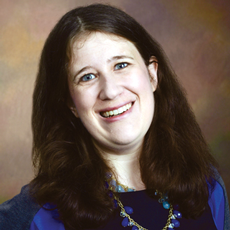
For many long-term care residents struggling with Alzheimer’s disease, their middle-aged child, or children, may be the people we often meet in family care planning. That’s why I was struck upon meeting two entrepreneurs, Carrie Shaw and Jacob Hamman, at the Ziegler Link.Age Fund Symposium conference last week.
The diagnosis of early-onset Alzheimer’s in their mothers when they were ages 19 and 31, respectively, has influenced their career trajectory, and offers an inspiring way to think differently about cognitive decline.
Rebecca Easterly Shaw was in her late 40s when she was diagnosed. Carrie Shaw, now the CEO of Embodied Labs, returned home to North Carolina to help her father in 2013. Over the course of three years, Shaw developed a new kind of relationship with her mother, even as Rebecca, who had been a speech language pathologist, could no longer recognize her.
“We developed this specific way of communicating without words. I was really thankful that I could have a relationship with her,” Shaw told me. The goal with Embodied Labs is for caregivers, in skilled nursing settings and beyond, to understand what the resident is going through. While that started with Alzheimer’s, Shaw’s next goal is to provide LGBTQ training.
Rebecca Shaw died in 2013, but her daughter said her values live on in their world.
“The biggest thing I love about my mom’s influence on our company is our core values are advocacy, diversey and highest quality work ethic,” Shaw said. “Who she was as a person is very much reflected in our company culture. She really empowers my sisters and me in the way she raised us to think about how to serve and volunteer, and to think about the world and the people who are in it.”
Hamman’s path holds many similarities to Shaw’s. Both have enlisted their siblings in founding their companies: Shaw’s sister Erin Washington is her business partner, and Justin Hamman is a co-founder at Zenjoi, which focuses on the virtual reality experience for Alzheimer’s and cognitively impaired patients. Zenjoi provides residents a variety of options, whether it’s pet therapy, music therapy, or helping with cognitive simulation.
When Linda Hamman was diagnosed, her oldest son was at Harvard University in his first year of graduate school. But afterward, Hamman and his youngest brother, Justin, moved home to help their father.
As they paired their brains together to use technology in a way to help take care of their mother, they realized their work could help others.
“We realized I had been learning about this new technology and creating prototypes for mom I thought would be fun,” Hamman told me.
One aspect I found incredibly meaningful at Ziegler was seeing how they used 360-degree videos of another brother, Luke, and his young family to allow his mom to feel as if she was there in the kitchen with them.
In addition, Linda Hamman’s parents, 87 and 92, recorded their own stories for her.
That’s helpful, as Linda still recognizes her family, but is losing the ability to communicate. She realizes what her children are working on when Jacob and Justin discuss virtual reality, even if they avoid talking about Alzheimer’s.
“She knows generally we’re doing virtual reality and she becomes excited or proud and she says, ‘I know that. I do that with these guys,’” Hamman said. “She knows we’re working on things that include her.”
In terms of company values, Hamman said his mother provides inspiration.
“Being around her is generally uplifting,” he said. “In a more direct way, in what we’re building, she’s been our earliest user.”
Apart from the obvious, which is that both companies should be of interest to those in the aging services field, there are a variety of lessons to take away from Shaw and Hamman. Both offer an inspiring look at how, in dire circumstances related to cognitive decline, those with passion and smarts can challenge the status quo.
But there’s another part: The families of residents, and providers in their own lives, may often have to recalibrate their lives when illness strikes.
“There is no way I could have predicted I would be living at home with my parents and helping care for my mom,” Hamman said. “You could never plan you’re going to be helping your mom take a shower. But I also never could have predicted I was invested in the world of neuroscience.”
For Shaw, she encourages families and caregivers not to always think of Alzheimer’s as a “disease of loss.”
“On a personal level, I’d encourage providers to look for new knowledge in unexpected places,” she said.
It’s good advice, and reminds us that these two are ones to watch.
Follow Deputy Editor Elizabeth Newman @TigerELN.




